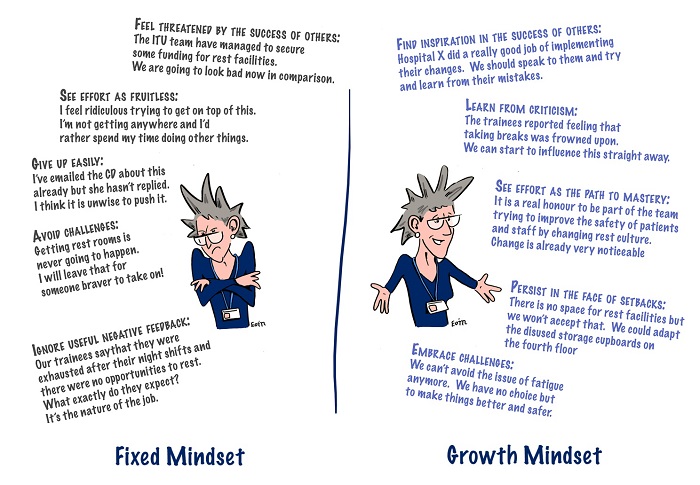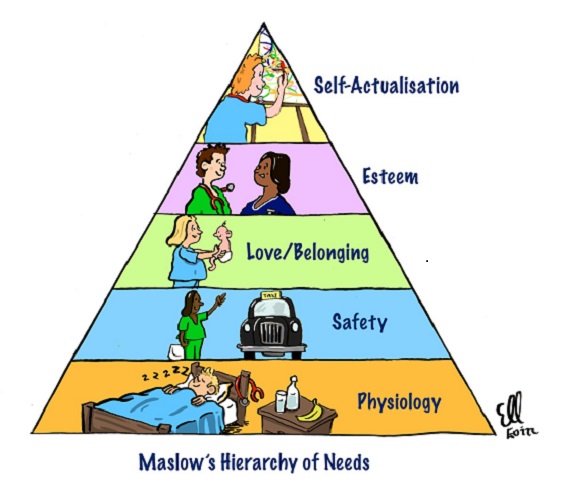What is feedback and what should we do with it?
'In an organisational context, feedback is the information sent to an entity about its prior behaviour so that the entity may adjust its current and future behaviour to achieve the desired results.' Carol S Dweck, PhD: Mindset: The New Psychology of Success. Ballantine Books, 2007.
It's important to remember that organisational feedback is complex and reflects many factors. In the context of the GMC survey, the responses provided by trainees will relate to their personal experiences, which are influenced by a large group of people, departmental culture, facilities and policies, as well as the trainee themselves.
While the presiding trend of responses will largely relate to the institution as a whole, these are made up of individual experiences which can vary from positive to negative, with the outliers reported in the results.
An organisation which has some negative outliers may not be wholly poor in that area and vice versa.
The key is using the information to adjust matters positively in the future. While results are likely to come to the attention of individuals for the purpose of action (college tutors, heads of school etc.), the impressions reflect the organisation globally, be they good, bad or neutral, and embracing the challenge of improvement, or celebration of success rests with many people. Inherent in the definition of feedback is the need for change and herein is the key to receiving and using it in the best way possible.
'Response to a stimulus (criticism or praise) is considered feedback only if it brings about a change in the entity's behaviour.' BusinessDictionary.com
Good feedback should not be interpreted as a tacit instruction to change nothing. Instead, it should be used as a template upon which to base good practice and continue to strive for optimum performance. This is not a passive process.
Negative feedback has the potential to give way to wide-reaching positive influences and bring about welcome transformations.
Tips on receiving positive feedback
While receiving good feedback is a pleasant experience in itself and often the reward for significant effort and work, it's important to use this to continue to improve.
Try to extract important information from the content and use this in order to continue to help the organisation evolve and remain on its positive trajectory.
Do ask questions if clarification is needed.
When looking at survey data, some responses are likely to be binary and unless free text entries are provided, important information may be overlooked.
Seek the opinions of colleagues and trainees to discuss how you can continue to improve.
Valuing the contributions and ideas of others is an important factor in maintaining wellbeing within a group.
Share the nice comments, praise and good feeling. It's unlikely that good feedback will have been received on the basis of your actions alone.
Take the time to write emails of recognition, verbally thank people, discuss the hard work of others within the organisation etc.
This is time very well spent and you will reap the benefits for a long time.
Do you do something in your department that's unique? Do you have yoga sessions at lunchtime? Do you have a departmental social club? Have you implemented something that's made a positive change? For example, have you managed to create some rest facilities when it seemed that none were available?
If there's something that makes your workforce and setup stand out then tell others about it.
Consider writing letters, submitting posters etc. Offer others the opportunity to learn from you. You can share fatigue related examples through the Association. Email [email protected] with your stories.
Establish an action plan in order to guide people through the next phase of maintenance + / - improvement. How are you going to continue to maintain high standards? Can you make changes that will complement what you already provide? How and when will you assess outcomes?
Tips on receiving negative feedback
Regarding GMC survey responses, remember this is not a personal reflection on you.
Your professional role means that you are the person who receives and acts upon the information. While it's understandable you may initially feel upset and overwhelmed by the nature of the data, do not dwell on this because the information reflects upon the institution as a whole.
Occupational psychologists suggest adopting the following approach when on the receiving end of bad feedback:
Listen carefully – it's easy to let feelings of dismay and upset cloud the act of taking the information on board. If this is the case then acknowledge it, pause until you feel a little less wounded and then make yourself fully open to what is being delivered.
Ask yourself if the content is based on fact or opinion. Both are important but you might approach each area differently. Having no beds for trainees to sleep in within your department is a fact. People feeling that they have been undermined is an opinion.
Opinion may still reflect an accurate event but it is, by definition, subjective.
Don't get defensive: it's in our nature to listen defensively. As we receive a dose of negative feedback, we tend to listen not to understand what's being said, but to spot distortions, inaccuracies or faulty conclusions. We listen so that we can either refute errors or justify our actions or prove the other individual wrong.
But even if the negative feedback we're getting is demonstrably wrong, it's not in our best interest to immediately try to prove it. In trying to prove someone wrong, we can appear argumentative, and our point of view is less likely to be acknowledged. We're also more likely to miss the useful information that may be hidden in the feedback.
Ask questions to better understand the situation instead.
If you show that you are trying to understand the perspective of others, they will be more receptive to your views.
Ask for time.
- This will allow you to defuse the immediate situation if required
- It will give you the opportunity to collect more information and become better able to understand what's required within your organisation in order to bring about change
- People can be recruited to help, funds can be accessed, and support can be garnered
- You can establish a clear plan for the future and embark upon this with preparation, understanding and calmness on your side
- Inform people about what is being done to move forward. Ask for their input. This is not your sole responsibility and people should accept that change will only occur with collective effort and good will
Those who deal with negative feedback best have a growth mindset versus a fixed one. They view the situation as an opportunity to improve and grow.

Further reading:
Carol S Dweck, Ph.D. Mindset: The New Psychology of Success. Ballantine Books. 2007.
Dick Grote. How to handle negative feedback. Harvard Business Review. 17 August 2015.
The human emotional responses to criticism
When we receive criticism, on a biological level, our brains respond in a similar way to how they respond to a physical threat.
Arguably, we are feeling threatened by the potential loss of our place in the social order of things. Threats to our standing in the eyes of others are remarkably potent biologically, almost as those to our very survival.
Maslow's hierarchy of needs depicts the needs of the human being in a pyramid ranging from the most basic, primal needs for survival up to the more sophisticated and finer needs that allow fulfillment of personal happiness.
Psychologists explain that criticism is perceived as such a threat that it interferes with human needs very low down in the pyramid at the level of safety and security.
A unique feature of criticism is that we remember it inaccurately. When we hear information that conflicts with our self-image, our instinct is to first change the information rather than ourselves. Due to the psychological processing of experiences and the phenomenon of negativity bias, we will always have stronger memories of criticism than of praise.

Further reading
Courtney Seiter. How to give and receive feedback at work. 9 December 2014.
AH Maslow. Maslow’s Hierarchy of Needs. A Theory of Human Motivation. Originally Published in Psychological Review, 1943.50, 370-396. Posted on June 16, 2012 by Research History.